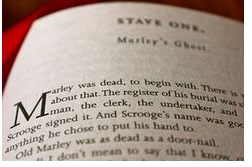Blogging & Musing
We read plenty about what book clubs think of authors (and their books). But here's a twist— author Cathy Lamb tells us what SHE thinks of book clubs . . .
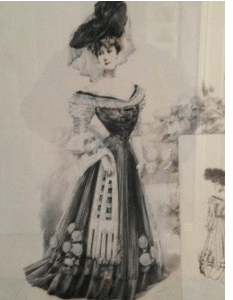 Here is a little secret: I love visiting with book groups.
Here is a little secret: I love visiting with book groups.
I chat with women here in Oregon and all around the country. Over the years I've heard some pretty funny comments—here are a few of the more amusing ones:
“My husband is an a--h--. He’s like Slick Dick in The Last Time I Was Me.”
“My husband gets irritated sometimes with how much time I spend with the kids but I say to him, ‘The kids hug me and want me to read them stories but you always want to have sex. Of course I’d rather read stories.’”
“The guys from the fire department came to take care of my husband, AGAIN, but I knew they thought he was crazy. He thought he was having another heart attack. His third that week. They didn’t say it, but I heard it: My husband is anxious about his anxiety. That’s what causes his heart to beat too fast.”
“My daughter shaves her legs too much. Is that weird?”
“Should we take off our tops like they did in Julia’s Chocolates?”
“Pot is now legal in Oregon. Do you think we should get a joint for the next book club meeting?”
“Did you run naked by a river, Cathy, like Jeanne in The Last Time I Was Me?”
“Oh, my gosh. We finished ANOTHER bottle of wine!”
“You know that sex therapist in your book, Cathy? How did you learn all that?”
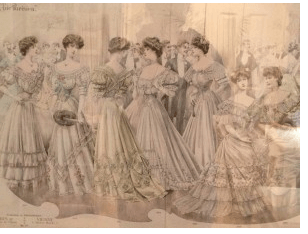 I visit many book groups during the year. If they’re within twenty minutes of my home, I go to their home. If not, we skype or chat via speaker phone.
I visit many book groups during the year. If they’re within twenty minutes of my home, I go to their home. If not, we skype or chat via speaker phone.
I’ve skyped with ladies in New York and Massachusetts, Florida and California, a whole pile of other states, and Canada. If there was a book group on the planet Pluto, I’d skype there, too.
Here’s what I’ve learned: All books groups are fantastically, mightily different from one another.
They all have different goals. Some book groups are very intellectual/literary. I have sat and been drilled about everything from character and plot development, to tone, symbolism, metaphors, pacing, structure, who are my favorite literary writers and why, etc.
Then there are groups who talk about the book half the time and chat and laugh the other half of the time.
There are other groups who read the book, talk about it for fifteen minutes, then dive into their lives. Their book group is a social group. Period. Some of ‘em don’t even hide that anymore.
Then there are groups of women who simply want to meet me, don’t want to talk a whole lot about the book, and did I want more wine? How about a couple more glasses? Beer? Vodka? They have that, too. (I don’t drink, but they do their best to make me happy.) One of my favorite groups only wanted to sit down and have dinner with me. They came in laughing and drank a whole ton of wine. It was a neighborhood book group, no one drove, and they stumbled home singing and chatting. They wanted a nice girlfriend sort of visit. I did not envy them their Book Group Hangovers.
One of my favorite groups only wanted to sit down and have dinner with me. They came in laughing and drank a whole ton of wine. It was a neighborhood book group, no one drove, and they stumbled home singing and chatting. They wanted a nice girlfriend sort of visit. I did not envy them their Book Group Hangovers.
Another book group was the Laughing Book Group. My stomach hurt when I left we laughed so hard. They were all fifty-plus and life was fun.
I once went to a book group that was very, very quiet, almost somber. No one laughed. Not once. They took their reading seriously. I could tell that my book, Julia’s Chocolates, was a wee bit too wild for a few of them. Perhaps they had not liked, Breast Power Psychic Night? Perhaps, Your Hormones and You: Taking Cover, Taking Charge, was a little much? Love scenes too graphic? I don’t know.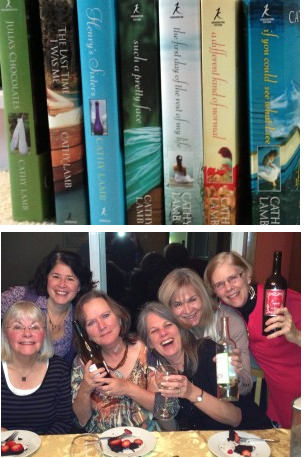 Some groups are small, only four or so women, others are thirty – plus. The age range in most of the groups varies from women in their twenties to women in their seventies.
Some groups are small, only four or so women, others are thirty – plus. The age range in most of the groups varies from women in their twenties to women in their seventies.
They want to know how I come up with my ideas, (wild imagination) how I write the book, (carefully, obsessively) what my daily life is like (just like theirs), are my characters based on real people (no), etc.
Anyhow, ladies, I’m happy to attend your book groups. Email me through my website, and we’ll set up a time.
Happy reading.
Cathy Lamb is a LitLovers author—4 of her books are listed here. We were delighted when she offered to do a guest post.
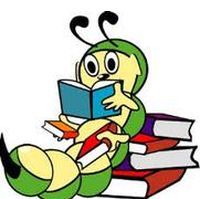 By Kristi Spuhler for LitLovers
By Kristi Spuhler for LitLoversFor most of us having a book to read is a given; it's something we take for granted.
But for some a book is a luxury—especially when it comes to underprivileged children whose parents are hard pressed to afford them. Worse: many libraries can't distribute library cards absent a return address.
Without the ability to practice reading, many children fall behind their peers. Here are the dire statistics:
A study by The American Educational Research Association found that 88% percent of children who are not reading on-level by third grade are unlikely to graduate from high school—pretty heavy repercussions from simply being unable to enjoy a book every now and again!Sue Henry wanted to do something in her hometown of Nashua, New Hampshire. So she created a one-time project called BOOKS TO KEEP to bring books to children in a local preschool learning program. That was nearly 20 years ago. Today she and her BOOK CLUB have duplicated the same program in The Villages of central Florida.
Over the last few months, Henry and her book club have delivered 5,000 books through 5 local shelters—and now they’re inviting other book clubs to start their own versions of the Books To Keep, project.
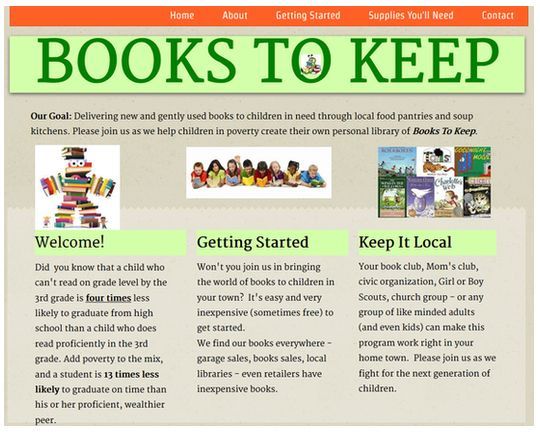
Getting started is simple, and Sue has some suggestions posted right on her site to help you get your project off the ground. To start your own donation organization, all you need to do is collect books, label them and distribute.
The donated books need not be brand new—you’d be surprised what you can find at garage sales, books sales, libraries and thrift stores. Once you begin searching for books and explaining the program, you may be surprised by how excited others are to get involved with your efforts!
The program caters to four basic categories: baby-board books, read-aloud, chapter books and YA/teen fiction. When dropping the books off at the designated pick-up stations, simply divide them into the four categories and wait to see how many of your books are "adopted" by local children in need.
This article from The Village Daily Sun does a wonderful job of outlining the program and displaying the impact Sue has made in just a few short months.
FOR BOOK CLUBS
If you're looking for a community project—a way to make a difference—why not consider starting your own BOOKS TO KEEP program? If you're interested, contact Sue Henry through her website.

February 9, 2014
I loved this website so much, that I created my book club TODAY! Approximately 8 members are IN! So, lets see what happens. I named it after my initials. LOL SO it's called MQ's Book Club.
—from MQ,
Dominican Republic
February 24, 2015
Today is the day. I'll send you the notes and some pictures :D i'm so happy. We are 14 girls now, initially. Let's see if it keeps up.
—from MQ
March 2, 2015
Everything went smoothly.... Everyone was happy to join, and I was so excited to make this little dream come true. Our first choices were "The Little Prince" and "The Old Man and the Sea": because they're classics and easy reads. (I didn't wanna start with a book that could give anyone an excuse not to read!).
—from MQ
And a couple more photos. Congratulations to MQ's BRAND NEW book club!
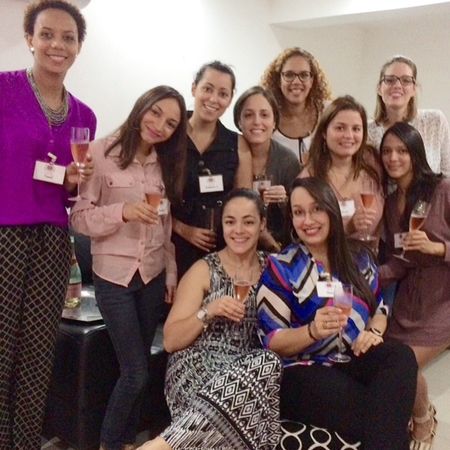
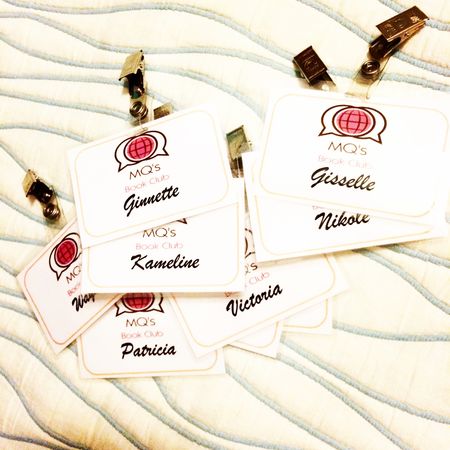
We've got plenty more clubs to read about. Take a look at all of our FEATURED CLUBS...and consider having your club featured on LitLovers.

By Kristi Spuhler for LitLovers
We recently came across this article on Bustle that celebrates the literary world of CATS, and that got us thinking—what literary DOGS do people love the most?
A few short months ago, we wrote about dogs making great reading companions, (especially for younger readers who may be struggling,) but now that we’re thinking about it, dogs make some pretty memorable characters in our favorite books as well. Here are just a few that come to mind:
Now that the contenders have weighed in, what do you think? Are dogs or cats more suited to a literary setting?Our 11 Favorite Literary Dogs
Travels With Charley, John Steinbeck
Who better to accompany a lone traveler on a 10,000 mile road trip than their faithful dog?The Curious Incident of The Dog In The Nighttime, Mark Haddon —Though not around for long, Wellington the poodle makes his presence known and sets in motion a monumental chain of events. The Wizard of Oz, L. Frank Baum
Is Dorothy’s companion, Toto, a lovable confidant or a sneaky canine hiding his powers of speech? Turns out, he may be a little of both.Marley and Me, John Grogan
"The World's Worst Dog" ends up teaching his owners about loyalty and unconditional love. Was anyone dry-eyed at the end?The Art of Racing in the Rain, Garth Stein
Confirms what we've know all along: dogs know far more about the human condition than they let on. This one sure does!A Song of Ice and Fire, George R.R. Martin
Direwolves Nymeria, Ghost, Lady, Summer, Shaggydog, Greywind steal the show when found as pups. Though they part ways, they're as much a part of the story as any other character.Call of the Wild and White Fang, Jack London
We follow Buck after he's stolen from his comfortable life and sold into sled dog slavery. In White Fang, we thrill to the growing bond between man and his wolf-dog.; Cujo, Stephen King
Far from lovable, this guy terrorizes the Trenton and Cambers families, to say nothing of readers. A victim of a rabid bat—he was a good dog at heart.Peter Pan, J.M. Barrie
A dog as British nanny? This charming twist is the perfect fit for J.M. Barrie’s fantasy about never growing up.The Phantom Tollbooth, Norton Juster
Tock proves to be a great companion for adventure and one who imparts a little wisdom along the way.Harry Potter, J.K. Rowling
Fang makes recurring appearances thoroughout the series. A Bit of a slobberer, even a coward, he’s still there when Hagrid needs him most.
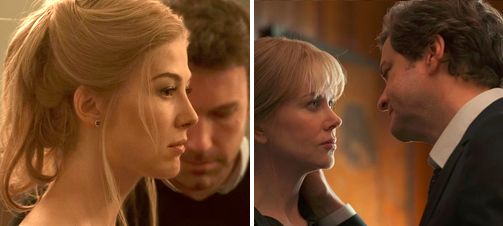
Gone Girl (Rosamund Pike, Ben Affleck) Before I Go to Sleep (Nicole Kidman, Colin Firth)
LOOK at them! These gorgeous people with their messed-up marriages—they captivate us. Of course, they're just characters out of BOOKS, who now find themselves writ extra large on screen, but still...
 |
 |
 |
 |
 |
 |
 |
 |
| Click on each cover for a summary. | |||
By our count, at least eight domestic thrillers have hit the shelves since 2011 and 2012—with the publication of Before I Go to Sleep and Gone Girl.
Considering the immense attention the books have garnered—both book sales and movie rights—it seems we can't get enough. The question is, why?
Why this morbid fascination? All eight books deal with psychopathically CREEPY marriages; surely, their wide appeal taps into some underlying anxiety on our part. And we haven't even taken TV's Wives with Knives into account!
At the very least, the number of books—and their popularity—suggest a new and disturbing attitude toward marriage, which has always been considered the sine qua non of a fulfilling life. Every single person knows far too well that ubiquitous question, "Ever going to get married?"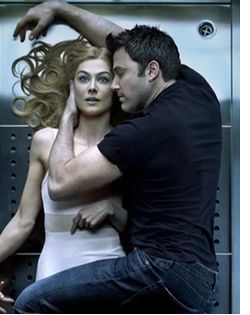 Maybe it's a suspicion of intimacy, a growing fear that genuine connection is unattainable. All the books reflect an innate distrust of "the other"—indeed, their overarching theme is the impossibility of truly knowing another being, even spouses.
Maybe it's a suspicion of intimacy, a growing fear that genuine connection is unattainable. All the books reflect an innate distrust of "the other"—indeed, their overarching theme is the impossibility of truly knowing another being, even spouses.
Or perhaps we suspect marriage is no longer up to the task of functioning as a stabilizing or cohesive force in life. Certainly none of the marriages in these books stave off chaos and loneliness. Just the opposite.
But, oh, pshaw! Here we go again, fooling around with mole hills and mountains. As a genre, creepy thrillers have a long history as great entertainment—think Dr. Jekyll and Mr. Hyde...even Hamlet...or go way back to Oedipus, for that matter. This is probably just one more pop culture phenomenon—like Zombies.
But Dear Reader, it's hard to think all this means NOTHING. After all, isn't literature supposed to be about SOMETHING? (Oh, and the Zombie craze? It's raised similar questions...)
So what do you think? Any ideas?
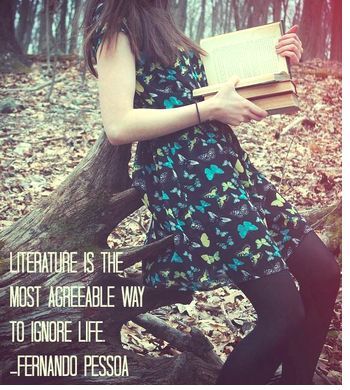 By Kristi Spuhler for LitLovers.
By Kristi Spuhler for LitLovers.We're sure you saw it—this photo we posted on Facebook a week or so ago. We found it funny because there's a grain of truth to it.
But it's probably more than "a grain" of truth: to be honest—just how much of our reading IS a way for us to ignore life?
You know—we pick up a book after a tough day to shrug off the stress. Or to beat the boredom during a mid-day slump. Maybe to put off chores...or simply to hide from a noisy world.
Of course, we tell ourselves—and everyone else—that our reading isn’t about escaping. No no! We're reading so we can understand the world around us.
And guess what? We're not just blowing hot air when we say that. A study published in the Journal of Science in October, 2013, found correlations between reading and an increase in emotional intelligence. Simply stated, reading helps us understand, and respond to, other’s feelings. (We blogged about this a good year ago. Take a peek here.)
But, okay, say we do read as escapism: even so...how often are we exposed to
♦ ideas we've long opposed but see there might be another side...
♦ troubled characters we come to care about...
♦ alien cultures we've gained some insight into?
An author’s vision can reveal the rich complexity of life—and yield up a new experience for the reader.
So even if we DO read to ignore life, we nonetheless end up engaging with it. WHY we read isn't as important as what we take away from it—which is an enlargement of our understanding and compassion.
So tell us—do you think reading has made a difference in how you understand and react to the world around you? We want to hear what you think!
 A dear friend gave me one of those gifts that keep on giving...and giving... AND GIVING—a beautiful hand-knit scarf. I was thrilled with it, THRILLED! ...until suddenly I wasn't. So what happened? Well, I sent her a note about the mess she got us ALL into. I wanted to be gentle.
A dear friend gave me one of those gifts that keep on giving...and giving... AND GIVING—a beautiful hand-knit scarf. I was thrilled with it, THRILLED! ...until suddenly I wasn't. So what happened? Well, I sent her a note about the mess she got us ALL into. I wanted to be gentle.True story (pretty much).December 28, 2014
Dear Sue,
You ruined my life.
There was a time I could jump out of bed and make it downstairs in an easy 10, get my coffee, and get to WORK.
But NOW, Sue...I jump out of bed and my eyes land on The Scarf. YOUR scarf. And here's what happens...
OOH...I think, that would look good with my new sky-blue blouse (The Limited, 50% off...down to $24.95). So I try it on. No...WAIT...how about the other blouse, the BLUE-GREEN-GRAY one (same 50% off sale). Oh, yes!!! But no. The collar's wrong.
WHOA! Lookie here...!!! I try on this smart blue (fleecy) vest. But the neck's too high. Okay maybe the beige crew-neck SWEATER: the scarf could dress it up a bit.
So, um...how should I wear this thing? Drape it in front and let it DANGLE? How 'bout a little tie in front? I COULD loop it first and then bring one end up over the shoulder. Or let's see...I could...
But wait, wait...look at this NECKLACE! It picks up the scarf's teal color! Hey, I should try that new turquoise jacket I got from CHICOS (online close-out for only $8.89 with FREE shipping). Yessss!
Nope—right color, wrong fabric. Okay, back to the beige sweater.
You see what's happening, Sue.
So I finally go downstairs to get to work. I've got 3 ponderous book reviews to get out this week.
But, Sue, I CAN'T CONCENTRATE. I'm having troub....
Oh, wait, I've got it! Back upstairs to try on that blue vest again (see above). Actually, it looks pretty good...with the NECKLACE (also above). OKAY...the vest and the necklace and the SCARF.
Back downstairs, Sue. Now to work.
Oops....... UPSTAIRS again. Just noticed there's red in the scarf—a smidgen—and I've got that new Macy's vest in a QUILTED RED pattern ... $17.69 because of a 40% sale, plus another 20% off with my new Macy's charge card, which I opened for that express purpose. Yep. the red vest looks good.
HOLD ON...! Just thought of something else. This time it's a black micro-knit top I keep folded in my dresser (center drawer, 2nd row down). Well, damn...that looks good. Oh, and look at this bracelet (top row, 3rd drawer from the left)...the way it picks up the scarf's teal. Ooh, NICE!
Back downstairs. And on it goes.
Sue. Your scarf has put MILLIONS OF LIVES at risk. Three, four MILLION lives around the globe.
I think you know, Sue, that I own and operate LitLovers—a Massively Important website...for Book Lovers. ♥ They depend on our guidance. They look to US for their literary fulfillment...and we CANNOT allow distractions.
But speaking of SCARVES, Sue...think you could you whip me up something...in, say, a taupe? You know, start with a soft GRAY, work it into some BEIGE and then (avoiding brown) bleed it gradually into a lovely tan (but NOT a TAWNY tan...that doesn't do much for me—too much yellow. I'm thinking a sort of mushroomy tan)? That would be lovely. Those colors would go well with a few THINGS I've got...?
It would fun to see what you could do.
Well, gotta get back to work...for now.
Love and kisses,
Molly
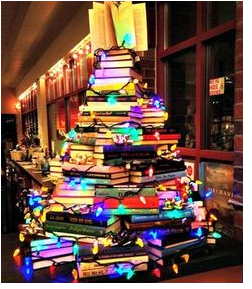 By Kristie Sphuler for LitLovers
By Kristie Sphuler for LitLoversWe know what you're thinking...because we're thinking it, too. In the few days you have off for the holidays, wouldn't it be lovely to spend them with a good book? Dream on, dear reader.
That pesky prepwork for the holidays has your free time sliced down to barely nothing...and your books spending more time with your bookmarks than with you.
If you’re book-obsessed, (don’t worry—we are too) your holiday might look a little like this.
Decorations
Yes, that's you, traipsing through rain...sleet...or snow to cut down a tree (or buy it off a corner lot), haul it home and decorate it—all because your personal favorite, the book tree, isn’t up to family standards. That little chore takes up precious reading time.Then there's the spectacle of watching people rrrr-i-p pages out of books for decorations. (Books... really?! Books?!) Go ahead (you're thinking), just rip my heart out while you're at it.
Giving
All of your stocking stuffers, and the majority of the gifts you give, come from the book store. It's one-stop shopping—getting it done FAST—so you can get back to that book you're reading. And it's all OK because nothing says love better than the gift of literature.
Receiving
Of course, what you really hope to see under the tree—with your name on it—is a BIG stack of books. Oh, yes, we remember that stab of disappointment from Christmases past...when the gift wasn't lit related. Oh, well, if you don't get books this year, console yourself: you've always got Christmases future.
Holiday Specials
Speaking of Christmases past and future: convincing your family that there is more than ONE book with great Christmas themes takes time and patience. Charles Dickens did not corner the market! (Though it’s still a terrific read...and a good one for the entire family. Everyone should read it.)
Cooking
Baking cookiesand doing Christmas dinner can take up more reading time than you want to spare. Just be careful though—don't get too distracted by your fictional life while baking in your real one or... oops....
Safety first, friends. Safety first.
So, yes, all you LitLovers—the holiday struggle is real. But you'll power through. You always do. Remember, there's a good book waiting when all is said and done.
Happy Holidays. And Happy Reading when it's all over!
 Do you have any idea how LUCKY we are that some people take on the burden of writing a novel? They're the ones willing to stare at a blank screen—then fill it with WORDS. And MORE words. Enough words for the likes of you and me to spend hours reading them.
Do you have any idea how LUCKY we are that some people take on the burden of writing a novel? They're the ones willing to stare at a blank screen—then fill it with WORDS. And MORE words. Enough words for the likes of you and me to spend hours reading them.
Philip Roth made the news a year or so ago. He was in a New York cafe when the young barrista approached saying that he, too, hoped to write a lot of really good words one day.
Roth's response...in so many words: DON'T DO IT! Writing words is HELL! It will ruin your life!
I recently attended a panel discussion at Hachette book publishers in which the moderator opened with the Philip Roth incident. "Do you agree with Roth?" she asked the three author-panelists. "Is writing a brutal process?"
Joshua Ferris was one of the panelists,* and he writes excellent words. To Rise Again at a Decent Hour, his third novel, was nominated for the 2014 Man Booker Prize; his second, Then We Came to the End, won the 2008 PEN/Hemingway Award.
Ferris talked about the difficulty of starting a novel: making the tough decisions about who tells the story and how it should be structured. He talked about finally settling down to write the first 100 pages of To Rise Again. And then ...
And then ... he realized it DIDN'T WORK, none of it. So he tossed all 100 pages. The pain of that, he said, was "excruciating." It wasn't just the words, he noted, or even the effort. It was the time, all that time subtracted from his life, time that came to nothing.
So why DO it? What makes authors like Ferris write a second...and a third book? Or in Philip Roth's case 40? We can't know, of course, but I suspect it's a need to to create a separate reality, to articulate a world view, or simply to tell a good story.
Whatever it is, our world is a better place because of that mystifying compulsion. Authors grapple with words, and we're the beneficiaries. So how lucky is that?
For book clubs:
Have any members ever written or tried to write fiction—either a novel or short story. Or perhaps tackled a memoir...or written poetry? How difficult is writing?
* The other fiction panelists were Jean Hanff Korelitz (You Should Have Known, 2014) and Edan Lepucki (California, 2014). There was also a nonfiction panel, which included Maureen Corrigan (So We Read On, 2014), Barbara Ehrenriech (Living with a Wild God, 2014), and Sam Kean (The Tale of the Dueling Neursurgeons, 2014).
 By Kristi Spuhler for LitLovers
By Kristi Spuhler for LitLoversThe way we read, and what we read, has been going through quite a transformation. With publishers focusing solely on what makes a bestseller, many exciting and groundbreaking reads are being passed over in favor of more cookie-cutter options. What’s a writer to do?
To find a way around these roadblocks many budding writers, as well as many previously published authors are turning to alternate methods to get their works published. According to Bowker, self-published titles saw a 59 percent increase from 2011 to 2012. And that number continues to grow.
With so many writers scrounging for the next best way to make sure their work makes it to the eyes of readers, one idea seems to be catching quite a bit of attention—Unbound.
A new groundbreaking method for publishing a work of writing, Unbound offers both established and budding authors the chance to go directly to the source when looking for the funds to publish their books—the readers! Much like similar sites Kickstarter and GoFundMe, Unbound allows writers to appeal to friends, followers and interested parties to pledge donations to see a project through to completion.
Don’t think the project is all one sided! Pledging to a project has its own set of advantages for the contributor as well. Depending on the project and the amount that you agree to contribute to the cause, each individual contributor has access to a set of rewards such as a signed copy of the printed book, or one-on-one meetings with the author.
The process is quite simple. Once you sign up for an account you then have access to author videos pitching their next project. From there you can choose which books you want to endorse and how much you want to contribute. Once the author is fully funded, their work then begins the publishing process. It’s really that simple.
To date, Unbound has helped to publish 54 books and they’ve raised over £1 million in funds from users. In an interview with writer Jason Hesse from Forbes.com, Unbound founder Dan Kieran stated, “Our users love to be involved in the process and have critical taste. They are not passive consumers – they’re micro patrons.” Sounds to us like the perfect opportunity to have a hand in getting the books YOU want to read published
What do you think about giving the power in publishing back to the readers? Would you like to jump in and choose which books are written and published? Leave us a comment and tell us what you think!
(Image courtesy of Kate Ter Harr.)
Site by BOOM
![]()
LitLovers © 2024












